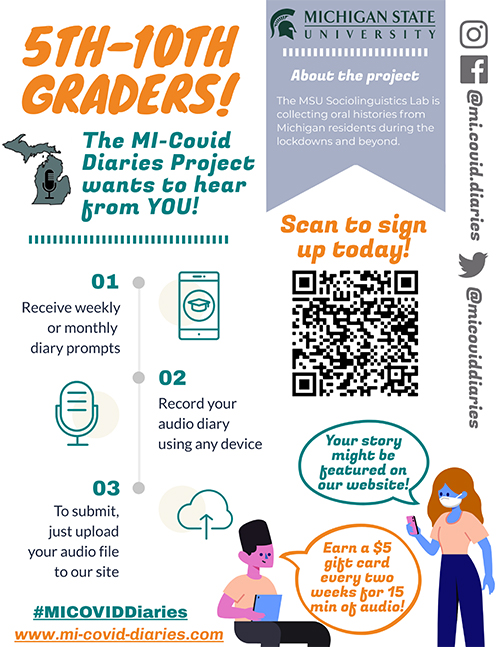
COVID-19 has had a major impact on people around the world, but how is the pandemic changing our language and the way we communicate? That is the question being studied by a team of researchers at Michigan State University, led by Associate Professor Suzanne Wagner and Assistant Professor Betsy Sneller.
The MI COVID Diaries project, run by MSU’s Sociolinguistics Lab, has been collecting recorded speech from Michigan residents since the beginning of April to track changes to language during the COVID-19 pandemic.
“Social distancing and distance learning are affecting how people behave in the world,” Sneller said. “Part of this project is to document how people’s lives are changing. But from the linguistics side, what we are interested in is how these social changes impact language use, both on a short-term scale and potentially on the long-term scale as well.”
For sociolinguists and scholars of language change, this research will provide a timely and important view of how this global event, and particularly the absence of face-to-face interaction, affects language change.
“Part of what we want to do is measure how language is changing in real time,” Sneller said. “By getting recordings from people at the beginning of this crisis and then throughout, we can then compare their speech to their own speech and see how it’s changed over the course of however long this takes. That is the ultimate goal.”
Historically, major events like natural disasters and war have proven to have big impacts on language. Wagner and Sneller expect the coronavirus pandemic will have an impact on language use as well.
Social distancing and distance learning are affecting how people behave in the world. Part of this project is to document how people’s lives are changing. But from the linguistics side, what we are interested in is how these social changes impact language use.
Dr. Betsy Sneller
“We know from numerous studies of 20th century speech from different communities around the world that the Second World War was a big inflection point for language change partly because, in contrast to the coronavirus pandemic, it brought people together who ordinarily wouldn’t have had contact with one another,” Wagner said. “People were mobilized and sent to bases or areas of war. It put women into the workforce interacting with people they normally wouldn’t have interacted with. And it led to greater industrialization after the war.
“There are lots of well-known cases like this where we can see changes happening to languages in lots of different places because people came together in ways they normally wouldn’t. Now we are seeing people being kept apart and we should perhaps expect to see similar seismic effects.”
Only Language Research Lab Doing COVID Longitudinal Study
The MSU Sociolinguistics Lab isn’t the only linguistics lab in the world doing this type of research, but it is the only one designed to hear from diarists throughout the whole crisis.
“There are a few other sites across the world doing COVID-related sociolinguistic work, but as far as we’re aware, we’re the only language research group doing a pandemic-focused longitudinal study,” Wagner said. “We also are lucky enough to have a basis for comparison, because in the Sociolinguistics Lab we’ve been doing some work over the last few years that has given us a database of Michigander speech that we can use for our pre-pandemic reference point.”

This research also is unusual in that the team first began collecting recordings only two weeks after Michigan’s Stay in Place order went into effect.
“We’re lucky that we got this project off the ground only a few weeks after the lock downs started, which as far as I know is the earliest,” Sneller said. “This allows us to capture the entire range of the COVID crisis and how things have been affected from the very beginning.”
There are a few other sites across the world doing COVID-related sociolinguistic work, but as far as we’re aware, we’re the only language research group doing a pandemic-focused longitudinal study.
Dr. Suzanne Wagner
Wagner and Sneller credit their student team as well as MSU staff with helping get the project up and running so quickly.
“We had fantastic help from MSU staff that mobilized rapidly to help us do this. It was just extraordinary and that speaks to Michigan State’s wonderful hiring and staff,” Wagner said. “We could not, by any means, do this without them.”

The research team anticipates they will be collecting personal recordings for at least two years.
“It will depend on what the COVID situation is and when a vaccine becomes widely available,” Sneller said. “But in order to fully capture the effects of social distancing, we have to be able to capture what happens as things go back to normal and that might be a long-tailed process.”
Seeking Participants for MI COVID Diaries
The research team is still recruiting Michigan residents, ages 3 and older, to be part of the study by sharing their experiences under COVID-19 restrictions. They are especially interested in hearing from students in 5th-10th grade as well as adults who work with teens, such as teachers and coaches.
Individuals from across the state are asked to document changes in social life and language by recording themselves talking about any number of life experiences and then submit the audio recordings.
Part of our goal is to give voice to people’s experiences. It’s an opportunity for people to take a little quiet time to think out loud and to process all the changes, big and small, that they’re going through in the pandemic.
Dr. Betsy Sneller
“Part of our goal is to give voice to people’s experiences,” Sneller said. “It’s an opportunity for people to take a little quiet time to think out loud and to process all the changes, big and small, that they’re going through in the pandemic.”
To participate, people can sign up on the MI COVID Diaries website by answering a few questions. Participants then receive regular emails, depending on how often they indicate they want to be contacted, that offer audio diary prompts to think about, such as “What was it like the first time you wore a mask outside?” and “Have you or anyone close to you had to cancel any big plans?”

The research team also has asked questions concerning language and how people communicate, such as “When you are wearing a mask have you noticed that you use your eyes or your hands to express things that you would have normally done with a smile? And, “Do you say ‘COVID’ or ‘coronavirus’ and do you call it different things with different people?”
Participants answer as many questions as they like and record themselves using a smartphone or other recording device. They then are asked to submit the short audio recordings to the MI COVID Diaries website. One participant has submitted recordings every day. A few others submit recordings every few days.
“We are trying to get as many Michiganders as possible from across the entire state,” Sneller said. “So far, 226 people have signed up, and of those 226 people, we have recordings from 67, so about one-third of the people who sign up are submitting recordings. The majority of people who have submitted at least one recording are regular contributors who submit recordings at least once a month or once every week or so.”

The research team has special ethics approval for children and teenagers to capture audio recordings from them with their parent’s help and permission. Recently they have been working with the MSU Extension 4-H program, among other organizations, to recruit youth participants.
“We are not asking people to record their kids for hours on end,” Wagner said. “If parents find that it’s fun to sit with their kid even for a couple minutes a week and find out what their child is thinking that could be beneficial for both the caregiver and for the child.”
The stories they have received range from people who postponed their wedding, to parents homeschooling their children, and comments on news stories such as the flooding in Midland and the Black Lives Matter protests and how these events are impacted by COVID.
Library of Michigan Partnership
The research team has partnered with the Library of Michigan to add to the regional documentation of the pandemic. The Library of Michigan is running its own archival project, called COVID-19: Save Your Story, to preserve the stories of daily lives in order to provide future historians, researchers, and students with information on life in Michigan during the pandemic.
“We asked them if they would be interested in having anonymous recordings and transcripts from our project and they said yes, absolutely,” Wagner said. “Our participants have the option when they sign up to also have their audio recordings preserved for the future in the Library of Michigan’s COVID-19: Save Your Story archive.”
Benefits to Research Participants
Not only are participants helping with research and historical preservation, they also are seeing personal benefits as well.
“We know that social isolation is very difficult for a lot of people and one our goals is to build a feeling of solidarity amongst people in Michigan,” Sneller said. “If you look at our archive page, each week we list two to three stories from people who have submitted audio files that week. Our goal is to give people a sense of community to show them they are not going through this alone, that there’s hope.”

Some participants have found the recordings to be a great way to process their own thoughts on a regular basis.
“Participants have gotten back about how much they enjoy doing this,” Sneller said. “We’ve heard from multiple people that the process of just sitting down and thinking about your life is very cathartic and therapeutic.”
More Information
The MI COVID Diaries project is supported by funding from MSU’s College of Arts & Letters including its Undergraduate Research Initiative, annual funds to the MSU Sociolinguistics Lab, and a summer faculty fellowship to Wagner. Speech-to-text processing is supported by a Google Cloud research grant to Sneller. A proposal for a large government-funded grant is currently under review.
For more information on the project or to participate, see the MI COVID Diaries website.


